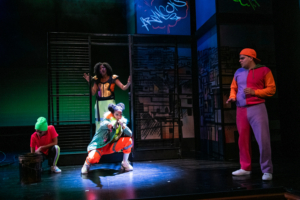Review: KID PRINCE AND PABLO at Kennedy Center

Photo by Michael Butcher/Elman Studio.
This rap-infused, woke update of Mark Twain's The Prince and The Pauper, a world premiere theater piece for young audiences commissioned by the Kennedy Center, has many charms and much humor, even if it goes more than a little heavy on the agitprop for audiences under the age of 10.
Expertly performed by an agile and protean cast of five -- three of whom (Yesenia Iglesias, Maya Jackson and Lynette Rathnam) take on multiple roles -- Kid Prince and Pablo moves Twain's 1881 novel to a near-future, set in a rough, urbanized country called the "United." Playwright Brian Quijada has a three-member chorus rap the United's history for us: A white, English-speaking ruling class lords it over a black and brown, often Spanish-speaking, underclass. Long ago, this land and its original inhabitants were "took" by colonizers then later experienced "waves" of immigrants until it "became like a box of crayons" -- what a great line, by the way. But then, the chorus tells us, "The country got wild -- violent -- people died." And now we're in the United's autocratic present day.
There is an underground movement afoot, fueled in its philosophy by rap, an art form that has been banned. Young Pablo (Marvin Quijada, the playwright's brother, who also composed the music) is a street rapper who lives on the outer edge of the anti-rap laws and worries his mother, who wishes he'd finally learn English. He gets arrested for rapping outside the palace. His ticket to freedom is the Prince, a.k.a. Max, who lives a pampered life inside the palace, while his ailing mother, the queen, rules. But Max harbors a secret love of rap, especially freestyling. He has Pablo brought to his chambers and asks for some pointers. Desperate to witness underground rap battles for himself, the prince persuades Pablo to switch outfits with him. He even makes Pablo powder his face with a glitter the upper classes all wear.
So off goes Prince Max to learn about rap in the underground, and off goes Pablo to the palace library where he reads voraciously and exclaims at one point, "Democracy -- oh!" The real Prince, out slumming, gets thrown into jail with a rap DJ and a breakdancer who both school him. Meanwhile, Pablo, barely maintaining his princely disguise, hears a general's plan to put down the rebellious underground with lethal force. The queen dies and creates a power vacuum. Pablo as the prince refuses to sign the general's order. (Parents note: at a climactic moment, there are sirens and a sense of danger in the land, though it's brief.) The eventual reunification of the country and the new understanding achieved by the prince after his adventures among the people manage to be heartwarming without any dollops of sugar.
The chorus tells us, "It was a long journey, but eventually the country danced together."
Director Pirronne Yousefzadeh's fast-moving, crisp staging of Quijada's at times lecturing script includes many grace notes. Apart from the generally high level of performance, these include lovely scenic, costume, projections and lighting designs by Carolyn Mraz, Danielle Preston, David Bengali and Cecilia Durbin, respectively. Mraz's scenery subtly evokes the old European shtetls memorialized in Marc Chagall's paintings when it shows the poor, immigrant part of the city, then later she brings in the neon colors of contemporary Western life. Preston's costumes, with their Sweet Tart colors and mix of leggings, sweats and baseball caps have a rakish wit . The rapping itself comes through crisply, thanks to sound designer Roc Lee. Only during the opening number is it drowned out at times due to live onstage drumming.
Composer Marvin Quijada as the immigrant hero Pablo occasionally accompanies live the raps sung by his sibling Brian as Prince Max and other characters. He underlays their words with a variety of bass-heavy beats, some of them improvised. It's pretty cool when his fingers hit the beat cues on a computer and are projected onto the set in real time.
However, it is not only the beats that are heavy in "Kid Prince and Pablo." This is a show that will send families home with endless fodder for dinner table conversation
Kid Prince and Pablo at the Kennedy Center Family Theater through Nov. 3, 2019. Written by Brian Quijada with music by Marvin Quijada, directed by Pirronne Yousefzadeh, choreography by Jocelyn E. Isaac. 202-467-4600. www.kennedy-center.org. $20.
Running Time: About 75 minutes with no intermission.
Recommended by the Kennedy Center for children 9 and older, but by this reviewer for kids 10-12 and older.
Add Your Comment
Videos

